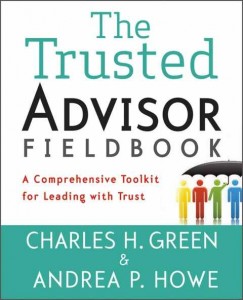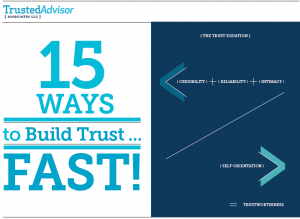We’re getting close.
The Trust Tips countdown continues to the release of “The Trusted Advisor Fieldbook: A Comprehensive Toolkit for Leading with Trust,” by myself and Andrea P. Howe, to published by Wiley Books in early November. We issue one Trust Tip per weekday; there are eleven more to come. They’re simple tips you can use every day to overcome the obstacles to having strong trust relationships. impede the trust-building process.
Get the tips straight from the source by following us directly on Twitter (@CharlesHGreen and @AndreaPHowe); you can also find them by using the hash-tag #TrustTip. We’d really enjoy hearing from you; the conversations have become a highlight of my day.
We’re also into making life easier for you, so we also keep a running tab of the tips right here on our site. If you need to catch up, see the recaps below:
#144-135
#134-115
#114-105
#104-90
#89-81
#80-71
#71-56
And now, skipping on down, here is the latest batch of Trust Tips: Numbers #30-12
#30: If the gods offer you a choice between competence and good relationships, assume it was probably a friendly gesture. Choose…
#29: The ultimate net promoter score driver: trust.
#28: If your competitor has a trusted relationship with a target client: go find a new target client.
#27: A short time-frame is one of the natural enemies of trust.
#26: If you don’t trust me, the odds of me trusting you just went down.
#25: Being brutally honest: what brutes do when they try to tell the truth.
#24: You can’t make somebody trust you; but you can make yourself more trustworthy.
#23: Only on TV quiz shows do you win by blurting out the answer before listening fully.
#22: Robinson Crusoe had no need for trust–at least not before Friday.
#21: Defining the problem is not worth very much unless the other party agrees with your definition.
#20: I trust my dog with my life–but not with my sandwich.
#19: Intent without action seems insincere: action without intent feels mechanical.
#18: Mind readers exist only in carnivals; in business, tell people what you mean.
#17: You get the right answer = you’re lucky. I get it = I’m smart. You agree with me = you’re wise.
#16: The sun is predictable; a man is reliable. Which are you?
#15: Doing the right thing is long-run profitable; but the profit is a byproduct, not a goal.
#14: All trust is personal; corporate trust is just accumulated interactions.
#13: Increased business trust reduces demand for lawyers and regulators.
#12 If someone trusts you, do you screw them? Why should you expect them to be any different?
A couple of my favorites:
#24: You can’t make somebody trust you; but you can make yourself more trustworthy.
This gets to the heart of the matter. In this world, you can never truly control another human being; trying to do so is the root of much misery. The only thing you can control in this world is your own actions—and your re-actions to others’ actions. You can spend hours trying to persuade someone to trust you, and all you’ll get is red in the face and high blood pressure.
Don’t tell someone you’re trustworthy—just act the part, and let them draw their own conclusions. And by the way, those conclusions are theirs too—leave them alone.
#17: You get the right answer = you’re lucky. I get it = I’m smart. You agree with me = you’re wise.
This is like ‘a recession is when your neighbor is laid off; a depression is when you are let go.’ Noticing things from the other’s perspective is never easy; worse, we tend toward assumptions that are self-serving (“I hardly ever have bad intentions. You, however, are frequently mean, clearly have it in for me, and probably always have.”)
But it’s possible to transcend this self-serving self-centeredness. When we recognize someone in the way that they see themselves, and freely acknowledge it, we get a double success. First, they appreciate the compliment (if compliments were involved—they don’t have to be). But much more importantly, they appreciate the notice itself—it is validating. We get credit for being wise just by understanding the Other from their perspective–and saying so.

 Over the past few months we’ve counted down 144 daily #TrustTips on Twitter. Each tip aimed to help you improve your trustworthiness and trusted relationships within your professional and personal lives. We collected them all
Over the past few months we’ve counted down 144 daily #TrustTips on Twitter. Each tip aimed to help you improve your trustworthiness and trusted relationships within your professional and personal lives. We collected them all  In case you missed it, here’s your opportunity to get a copy of our latest eBook, “
In case you missed it, here’s your opportunity to get a copy of our latest eBook, “